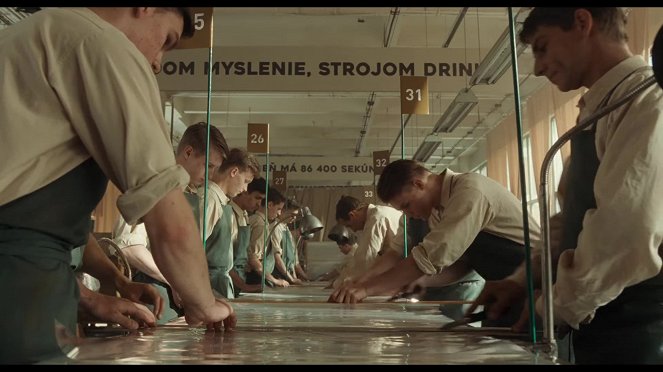Director:
Matěj ChlupáčekGuión:
Miro ŠifraCámara:
Martin DoubaMúsica:
Simon GoffReparto:
Eliška Křenková, Miloslav König, Milan Ondrík, Marián Mitaš, Luboš Veselý, Martha Issová, Ladislav Hampl, Ján Jackuliak, Anton Šulík ml., Richard Langdon (más)Sinopsis(1)
In the 1930s, a pregnant doctor must navigate a web of superstition and prejudice while seeking the truth about a shocking find at her husband's factory. (Netflix)
Videos (4)
Reseñas (8)
Gran nivel técnico. La elección de la época y el escenario y el diseño de producción asociado, el uso de edificios en miniatura y los efectos que incorporan personajes vivos en ellos son excelentes. Incluso el maquillaje protésico del rostro de Ladislav Hampl parece bastante sólido. Pero la historia, sus temas y personajes asociados funcionan peor y a veces parecen tan torpes como el tonto título en inglés We Have Never Been Modern. Tengo un problema con varios de los aspectos morales de la película, que se presentan como totalmente no problemáticos o, en buena medida, no se mencionan en absoluto. En general, sin embargo, sigue siendo una de las obras temáticamente más interesantes del cine checo de este año, aunque en mi opinión un poco en la línea del dicho "en el país de los ciegos, el tuerto es el rey". [KVIFF 2022]
()
Para un director de 29 años, es una carga extremadamente ambiciosa con fuertes momentos íntimos de un tema no ordinario y socialmente sensible. We Have Never Been Modern funciona fantásticamente en su mensaje atemporal sobre la estrechez, el prejuicio y la intolerancia imposibles de erradicar de la sociedad hacia cualquier cosa diferente. Sin embargo, no funcionará para todos en la interacción de temas secundarios (la relación problemática entre el personaje principal y su marido arribista, la figura inquietante de un miembro de la contrainteligencia) o al ubicarla en el micromundo industrial de Baťa. Al mismo tiempo, es este mundo el que se suma al atractivo de la película para la audiencia, así como el anclaje histórico de la historia para subrayar mejor la idea. Y con fondos de estudio bellamente estilizados en el primer plano de los Altos Tatras, también completa la pátina artística de la parábola artística. Aunque no maduro en todos sus detalles, ciertamente es algo que la mayoría de los cineastas checos no se atreverían a hacer. Matěj Chlupáček está en otro mundo, y si en los próximos diez años sigue el mismo camino que tomó entre Touchless y We Have Never Been, su tercer largometraje recibirá una gran ovación incluso en Cannes y Venecia. [Karlovy Vary IFF]
()
I would very roughly describe We Have Never Been Modern as a period detective melodrama, but it cannot fulfil any of the characteristics of that genre, because it is a film with a fluid genre identity. This corresponds to one of the film’s central themes, which is the inconstancy of gender identities and social roles, as well as the impossibility of incorporating certain facts into familiar frameworks and categories. Though the story takes place in the 1930s, its strength lies in something that isn’t often seen in Czech period dramas – it clearly relates to problems that are relevant to the present. The essence of the film is not the black-and-white struggle against Nazism or Communism, but rather the current feeling of anxiety caused by a society that is only outwardly modern while it allows the restriction of human rights and individuality under the pretext of rationalisation, automation, security, economic growth and building a better tomorrow. If we wanted to identify a villain in the narrative, it’s not the state or the group representing a particular ideology, but the company and its capitalist logic based on thoughtless expansion and exploitation. This is connected with the key theme of the clash between tradition and modernity, where it is again shown that even though we have state-of-the-art production processes, that doesn’t help us much if there isn’t any progress in the thinking of people who cling to certain prejudices and stereotypes and who have the need to determine for others what is normal and to tell people how they are supposed to live. The consequence of that is that this emerging better world is accessible only to those who submit to the given norms and fall in line. The intersex character is a threat to the given order and rationality. In how the others treat her, we see an example of the reactions that we can still encounter today. Ridicule, denial and elimination, as well as the effort to ascertain the necessary facts and to understand exactly what it means not to unambiguously be either a man or a woman from the biological perspective. Together with how the reaction of the female protagonist played by Eliška Křenková evolves, the genre of the film also evolves. Mysterious crime thriller, science film, melodrama, social drama… Though I understand that the changes in genre and making the otherwise imperceptible style visible (the animated interlude, Helena’s glances into the camera, the pointing out of how every retelling of events is also an interpretation over which the participants in those events have no control) may be unsettling for some, they are based on what the film thematises, i.e. rebelling against norms, being uncategorisable, deviating from convention. This brings both anxiety and an awakening (or a new perspective on the matter), which is true both for both Saša and Helena, who realises who or what is important to her in life. Just as the film is ambiguous in terms of genre, the characters are not black-and-white. The complex female protagonist, again something quite rare in Czech cinema, is portrayed superbly by Eliška Křenková. Her Helena convincingly transitions between bitterly commenting on the events happening around her and displays of sensitivity, while also imposing on others her idea of what she thinks is right. The clash of different worlds and attitudes is not conveyed only in the scenography or the work with colours, but also in the contrasting acting performance (the informal Křenková vs. the deliberately affected König), as well as in the use of anachronisms (for example, the fact that the characters use modern language), which highlights the parallels with today. Whereas, in the end, Helena looks to the future with legitimate concerns (as we should too), the future of Czech audio-visual art appears to be somewhat more promising with creators such as Šifra, Douba and Chlupáček. Their We Have Never Been Modern is in fact a modern, refreshing film with a well-developed concept that I believe can spur a discussion of issues that should be addressed today.
()
(menos)
(más)
Someone filmed a series that was decided to be only a film in post-production. Actually, I'm a bit disappointed not to rate it higher because its crafty creative ambitions are easily justifiable on a European scale, but the development of the plot on multiple fronts only leads to a satisfying conclusion in one case (the marital dispute on the staircase, where the perception of the characters is completely turned around, is a screenplay gem, no debate about it), while each of the fronts deserved to be explored much more. Thus, it remains a cheap crime story from a dime-store detective novel, the building of capitalism on the scale of a newspaper article, and a counter-diversion action from a wet dream of a novice spy. However, the "modern" theme of the film holds up, a bit clumsily but effectively and sensitively, in retro attire. 3 and ½.
()
It’s a shame that of all the topics raised in We Have Never Been Modern (the Czech industrialist Baťa’s utopia/dystopia, tolerance, the political grudges of the First Republic, women’s standing in society), the film doesn’t really develop any of them and rather merely presents them. Similarly, it awkwardly shifts between the genre layers of an otherwise appealingly constructed story. The film seems as neglected as the female protagonist, whose suspicious “rightness” becomes problematic only in the end. The powerful dilemma is resolved very carefully in the comfort zone of Baťa-style modernism. We Have Never Been Modern proceeds with caution and is a bit clumsy in explaining things (the doctor’s animated lecture about hermaphroditism was the only WTF moment). In spite of that, however, it is one of the most interesting films that Czech cinema has generated in recent years. The attempt to be different and to make a masterfully crafted period piece is quite obvious, but I couldn’t shake off the impression that the film occasionally couldn’t get out of its own way in its effort to not go down the well-trodden paths.
()



Anuncio